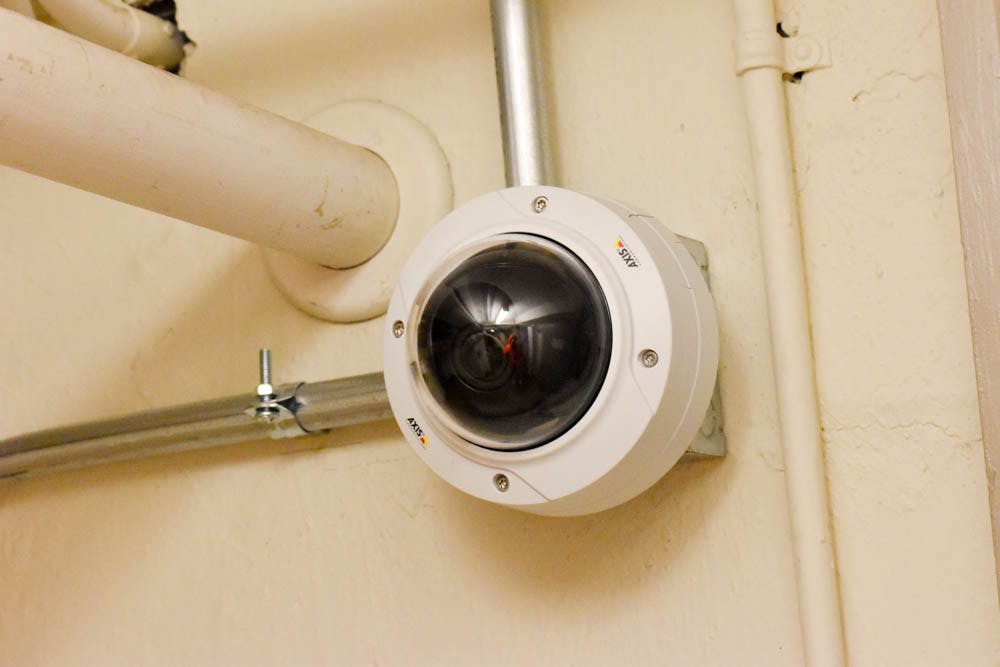Following more than 15 instances of homophobic and anti-Semitic graffiti in Hegeman Hall since November 2019, the University has installed security cameras in common areas of the residence hall, said Koren Bakkegard, associate vice president for campus life and dean of students.
Contractors and Department of Public Safety officers began installing cameras on Feb. 17 and 18, according to an email to Hegeman residents from Bakkegard and Eric Estes, vice president for campus life. These common areas include stairwells, lounges and laundry rooms. Bakkegard and Estes noted that the University still hopes to maintain student privacy by ensuring that no cameras can capture student rooms, suites, bathrooms or adjacent areas.
As part of DPS’s ongoing hate crime investigation into these incidents, DPS detectives have interviewed a number of individuals and student residents, said Chief of Police Mark Porter. Detectives are also examining evidence related to the incidents, Porter added.
To Porter’s knowledge, the installation of cameras in Hegeman marks the first time the University has used security cameras inside a dormitory. Though there have been cases of hateful graffiti in the past, Porter said those instances were not as “pervasive or ongoing” as the current pattern of graffiti in Hegeman.
Bakkegard said that the use of cameras in a residence hall is not the University’s “normal” or “typical” practice.
The University uses approximately 800 cameras on and off campus, a large majority of which are located in “high traffic areas” such as public streets and walkways or in areas with high crime activity, Porter said. He stressed that DPS does not monitor University security cameras “around the clock,” including those in Hegeman. Rather, DPS uses them “as an investigative tool,” Porter said.
The decision to implement cameras was made collectively and primarily by the Office of Campus Life, the Office of Institutional Equity and Diversity and DPS, Bakkegard and Estes wrote in an email to the Herald. The LGBTQ Center and the Department of Facilities Management also joined conversations with those offices starting in early December to address the situation, they said.
Porter said that DPS felt it was necessary “to utilize (cameras) to assist in solving this type of crime” and emphasized the importance of preserving student privacy. “Our goal is to deter and solve this crime. Our goal is not to place cameras outside of student rooms and in other private space, but rather to put them in specific common hallways or entrances where most of these incidents have occurred,” Porter added.
The University will later determine whether more cameras are necessary or whether the cameras can be deactivated or removed after the completion of the investigation, Bakkegard said.
Before deciding to implement cameras, Bakkegard and Estes had hoped that students would come forward with information to DPS following email communications with Hegeman residents on Jan. 17 and Feb. 5. “There hasn’t been any additional information shared with DPS since those communications, and since the behavior hasn’t stopped, that was why we reached this point,” Bakkegard said.
Current Hegeman residents acknowledged the tension between student safety and privacy and questioned the University’s usage of cameras in the residence hall.
“How do you investigate something like this where it takes (perpetrators) five seconds to commit a hate crime?” said Jack Waters ’21, one of the Hegeman resident who found the most recent swastika graffiti. “Something so extreme is also so brief, and I don’t know what else (the University) could do other than condemn it” and continue to investigate, he added.
Michael LeClerc ’20.5, another Hegeman resident who discovered the anti-Semitic graffiti, said that he would prefer a community-based response over cameras. Though the University originally guided students to resources like Counseling and Psychological Services and the LGBTQ Center and recently held a community gathering, LeClerc noted that the University has not yet organized a Hegeman-wide meeting addressing the incidences.
LeClerc expressed concern about “sacrificing (residents’) ability to not feel watched” in the name of safety rather than relying on community accountability. “I think the community can and should be trusted to police itself now that it knows what to be looking for,” he said.
In the week prior to the installation, staff members of various University offices held drop-in hours in an empty suite of Hegeman B in an attempt to be present for the Hegeman community, Bakkegard said. These offices included the LGBTQ Center, the Office of Title IX and Gender Equity, the Office of the Chaplains and Religious Life, Brown/RISD Hillel, CAPS, ResLife, the Office of Campus Life, Student Support Services and the OIED.
“I haven’t asked all of the staff who were present how many students came to see them (but) staff that I happened to see reported that no students came to see them,” said Bakkegard. “I’m not sure if it just turned out not to be a good time for students to come to see us or if that wasn’t the format that was useful for them.”
Both LeClerc and Waters voiced concerns about the tension between granting more attention to perpetrators and educating the community to be attentive to these sorts of incidents. Additionally, they expressed doubt about how effective cameras will ultimately be in finding perpetrators or addressing the issue.
“By putting surveillance cameras up, it’s not necessarily ending the problem. It’s just preventing (perpetrators) from continuing to do this one expression of the problem,” Waters said.
Mollie Redman ’21, a Hegeman resident, was contacted by a DPS detective in early January while she was on campus for her Wintersession course. During winter break, the University discovered several additional instances of homophobic graffiti, The Herald previuously reported. Redman shared similar concerns that cameras will give up student privacy, but may not necessarily help investigators find the perpetrators.





